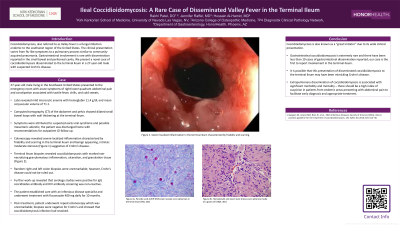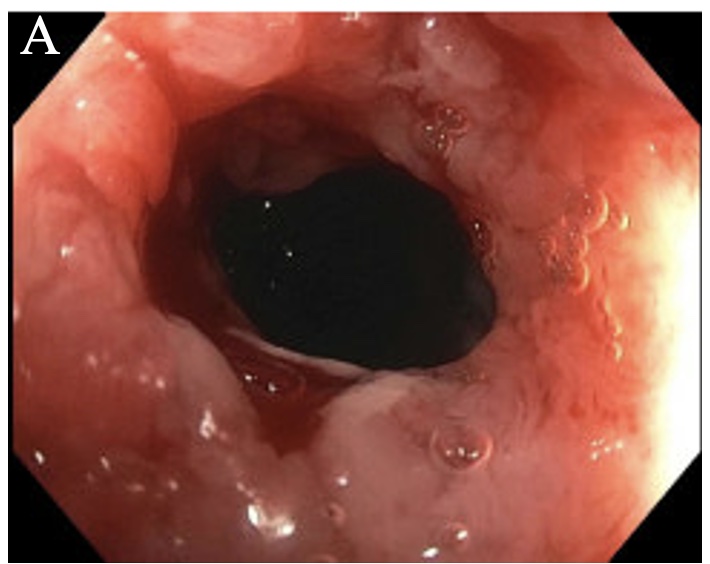Tuesday Poster Session
Category: Small Intestine
P4967 - Ileal Coccidioidomycosis: A Rare Case of Disseminated Valley Fever in the Terminal Ileum
Tuesday, October 29, 2024
10:30 AM - 4:00 PM ET
Location: Exhibit Hall E

Has Audio
- RP
Rakhi Patel, DO
Arizona College of Osteopathic Medicine, Midwestern University
Las Vegas, NV
Presenting Author(s)
Rakhi Patel, DO1, Jennifer Raffel, MD2, Hussein Al-Hamid, MD3
1Arizona College of Osteopathic Medicine, Midwestern University, Las Vegas, NV; 2P4 Diagnostix Clinical Pathology Network, Tempe, AZ; 3HonorHealth, Scottsdale, AZ
Introduction: Coccidioidomycosis, also referred to as Valley fever is a fungal infection endemic to the southwest region of the United States. Clinical presentation varies from flu-like symptoms to a pulmonary process similar to community acquired pneumonia. Gastrointestinal involvement is rare with dissemination reported in the small bowel and peritoneal cavity. We present a novel case of coccidioidomycosis disseminated to the terminal ileum in a 27-year-old male with suspected Crohn’s disease.
Case Description/Methods: A 27-year-old male living in the Southwest United States presented to the emergency room with acute symptoms of right lower quadrant abdominal pain and constipation associated with tactile fever, chills, and cold sweats. Labs revealed mild microcytic anemia with hemoglobin 11.4 g/dL and mean corpuscular volume of 71.1. Computed tomography (CT) of the abdomen and pelvis showed dilated small bowel loops with wall thickening at the terminal ileum. Symptoms were attributed to suspected early viral syndrome and possible mesenteric adenitis; the patient was discharged home with recommendations for outpatient GI follow up. Colonoscopy revealed severe localized inflammation characterized by friability and scarring in the terminal ileum and benign appearing, intrinsic moderate stenosis (Figure 1). Terminal ileum biopsies revealed coccidioidomycosis with marked non-necrotizing granulomatous inflammation, ulceration, and granulation tissue. Random right and left colon biopsies were unremarkable; however, Crohn’s disease could not be ruled out. Further work-up revealed that serology studies were positive for IgG coccidioides antibody and HIV antibody screening was non-reactive. The patient established care with an infectious disease specialist and was started on fluconazole 400 mg daily for 6-12 months with recommendations to repeat colonoscopy upon completion of therapy to rule out Crohn’s disease.
Discussion: To our knowledge, this is the first reported case of disseminated coccidioidomycosis to the terminal ileum. Although there is a strong suspicion for Crohn’s disease in our patient, at this time it is unclear whether this manifestation of coccidioidomycosis is related to Crohn’s versus other immunodeficiency. Coccidioidomycosis is also known as a “great imitator” due to its wide clinical presentation; it is possible that this presentation of disseminated coccidioidomycosis to the terminal ileum may be mimicking Crohn’s disease.

Disclosures:
Rakhi Patel, DO1, Jennifer Raffel, MD2, Hussein Al-Hamid, MD3. P4967 - Ileal Coccidioidomycosis: A Rare Case of Disseminated Valley Fever in the Terminal Ileum, ACG 2024 Annual Scientific Meeting Abstracts. Philadelphia, PA: American College of Gastroenterology.
1Arizona College of Osteopathic Medicine, Midwestern University, Las Vegas, NV; 2P4 Diagnostix Clinical Pathology Network, Tempe, AZ; 3HonorHealth, Scottsdale, AZ
Introduction: Coccidioidomycosis, also referred to as Valley fever is a fungal infection endemic to the southwest region of the United States. Clinical presentation varies from flu-like symptoms to a pulmonary process similar to community acquired pneumonia. Gastrointestinal involvement is rare with dissemination reported in the small bowel and peritoneal cavity. We present a novel case of coccidioidomycosis disseminated to the terminal ileum in a 27-year-old male with suspected Crohn’s disease.
Case Description/Methods: A 27-year-old male living in the Southwest United States presented to the emergency room with acute symptoms of right lower quadrant abdominal pain and constipation associated with tactile fever, chills, and cold sweats. Labs revealed mild microcytic anemia with hemoglobin 11.4 g/dL and mean corpuscular volume of 71.1. Computed tomography (CT) of the abdomen and pelvis showed dilated small bowel loops with wall thickening at the terminal ileum. Symptoms were attributed to suspected early viral syndrome and possible mesenteric adenitis; the patient was discharged home with recommendations for outpatient GI follow up. Colonoscopy revealed severe localized inflammation characterized by friability and scarring in the terminal ileum and benign appearing, intrinsic moderate stenosis (Figure 1). Terminal ileum biopsies revealed coccidioidomycosis with marked non-necrotizing granulomatous inflammation, ulceration, and granulation tissue. Random right and left colon biopsies were unremarkable; however, Crohn’s disease could not be ruled out. Further work-up revealed that serology studies were positive for IgG coccidioides antibody and HIV antibody screening was non-reactive. The patient established care with an infectious disease specialist and was started on fluconazole 400 mg daily for 6-12 months with recommendations to repeat colonoscopy upon completion of therapy to rule out Crohn’s disease.
Discussion: To our knowledge, this is the first reported case of disseminated coccidioidomycosis to the terminal ileum. Although there is a strong suspicion for Crohn’s disease in our patient, at this time it is unclear whether this manifestation of coccidioidomycosis is related to Crohn’s versus other immunodeficiency. Coccidioidomycosis is also known as a “great imitator” due to its wide clinical presentation; it is possible that this presentation of disseminated coccidioidomycosis to the terminal ileum may be mimicking Crohn’s disease.

Figure: Figure A. Severe localized inflammation in the terminal ileum characterized by friability and scarring.
Disclosures:
Rakhi Patel indicated no relevant financial relationships.
Jennifer Raffel indicated no relevant financial relationships.
Hussein Al-Hamid indicated no relevant financial relationships.
Rakhi Patel, DO1, Jennifer Raffel, MD2, Hussein Al-Hamid, MD3. P4967 - Ileal Coccidioidomycosis: A Rare Case of Disseminated Valley Fever in the Terminal Ileum, ACG 2024 Annual Scientific Meeting Abstracts. Philadelphia, PA: American College of Gastroenterology.
